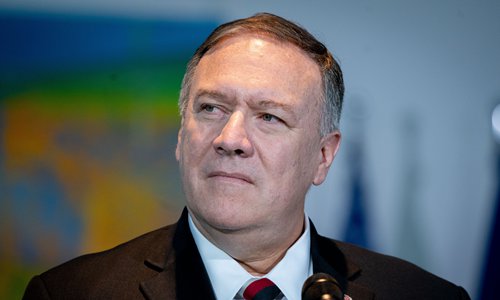HOME >> OPINION
Pompeo's outdated banner of values finds few followers
By Mu Lu Source:Global Times Published: 2019/11/10 18:53:40

Mike Pompeo, US Secretary of State, takes part in a press statement with the Chancellor at the Federal Chancellery on November 8 in Berlin. Photo: IC
In his Friday speech delivered in the German capital Berlin, one day before the 30th anniversary of the fall of the Berlin Wall, US Secretary of State Mike Pompeo dragged people back to the times of the Cold War by once again clubbing China and Russia together on the side of countries under ideological struggle, and so-called free countries on the other side.
Pompeo's narcissistic statements won't be shared by all US allies and the bellicose diplomat failed to realize that what really matters is how to solve problems between the US and its allies.
Europe is "on the edge of a precipice," French President Emmanuel Macron told The Economist in an interview. The US is one of the major hands that pushed Europe to such a position.
The reason Macron made such remarks is what used to work - the US united the West within NATO to develop stronger allies and thus dominate the world order by upholding ideological struggles and competition of values during the Cold War - will not work anymore. What the US is doing is tearing apart the foundation of EU-US cooperation.
Europe itself has been through changes and upheavals. From the European Economic Community to the European Union, Europeans have established a powerful market but failed to act like a political bloc that can make itself heard loud and clear in the world. This leaves the continent festering with internal disputes that cannot be resolved by so-called cohesive force of values.
On the other hand, there have been rifts between EU and US. The US is now focusing on making itself great again. It began to feel it had done too much for Europe and things can never go in that way - Europeans must do more in return. Thus, the two sides are undergoing trade tensions and disputes in NATO members' defense spending, which have affected Europe's economic growth.
The biggest challenge Europe faces is a possible real recession, but the US seems not likely to give a hand to ease Europeans' concern. Although Pompeo said the US wants to increase trade with Europe, he underlined that it must be "conducted in a way that is consistent with the history of free trade around the world where we join together." This shows that "America First" is the starting point for the US to solve disagreements.
Washington still wishes to use its outdated banner of values to integrate US and Europe, which is unlikely to be carried out, as amid a rapidly changing world order, like Macron said, Europe has found it "so difficult to move forward" and the US has turned its back on Europe "so quickly on strategic issues."
Macron's remarks can represent the view of only a part of Europeans with some still wishing to rely on Americans to advance. But more countries have realized relying on Washington won't work for them eventually - the interests of the two sides are no longer agreeing with each other's.
More importantly, the US itself has changed. Pompeo warned free countries should work together against China and Russia to "defend what was hard-won" in the American Revolution, WWII's end and the fall of the Berlin Wall. However, what Pompeo emphasized is in the service of US rivaling China. Underneath the veneer of so-called "duty" is the "America First" policy and Cold War mindset that would rather sacrifice Europe and profit from it.
Europe will not be fooled.
Posted in: OBSERVER